#Ago Edizioni
Text
[L’attesa del diavolo][Mary MacLane]
Mary MacLane: Contro le convenzioni, una voce libera tra diario e romanzo
Titolo: L’attesa del diavoloScritto da: Mary MacLaneEdito da: Ago EdizioniAnno: 2024Pagine: 240ISBN: 9788894755411
La sinossi di L’attesa del diavolo di Mary MacLane
Dalla postfazione di Sofia Artuso: «Mary MacLane vive isolata, preda della monotonia di una cittadina del Montana, incatenata alle rigide norme sociali…
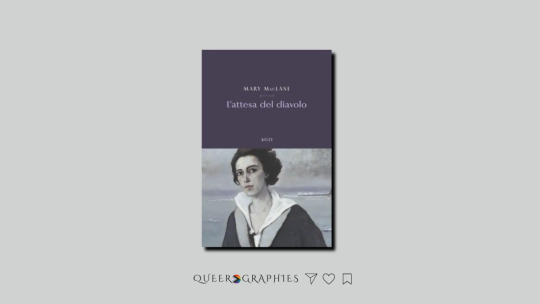
View On WordPress
#2024#Ago Edizioni#Canada#fiction#gay#I Await the Devil’s Coming#L’attesa del diavolo#LGBT#LGBTQ#Mary MacLane#memoir#Narrativa#narrativa italiana
0 notes
Text

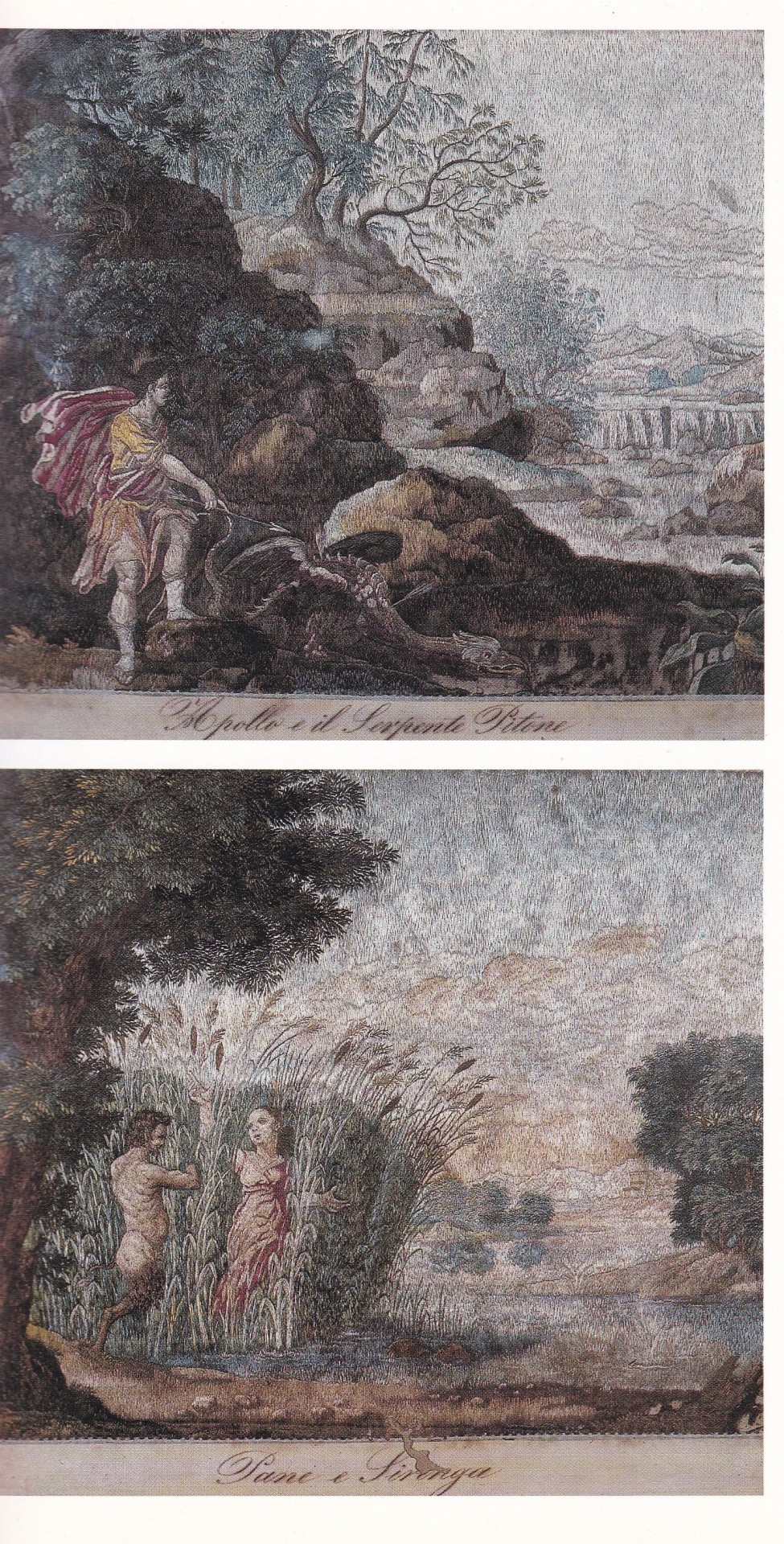
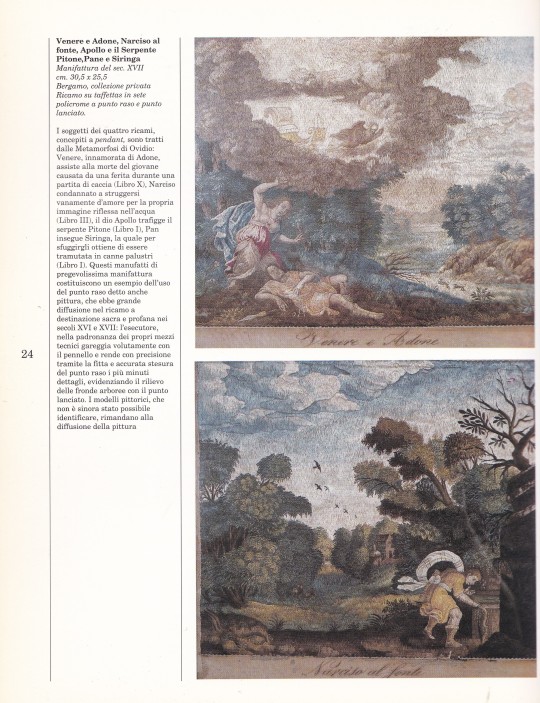
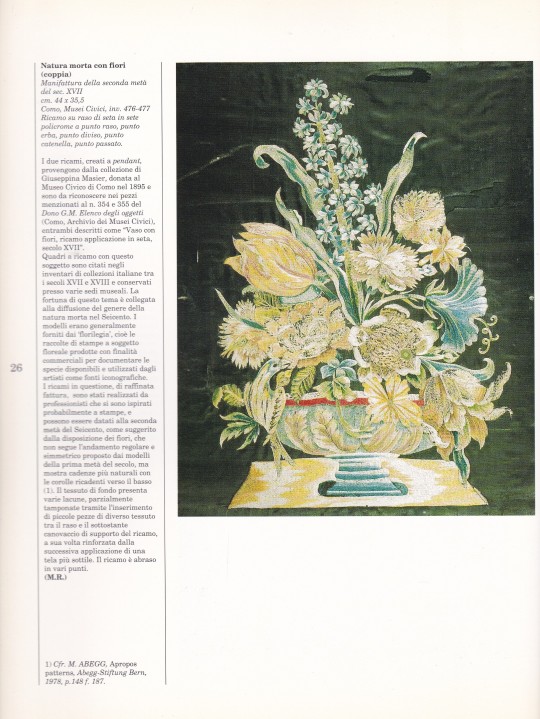
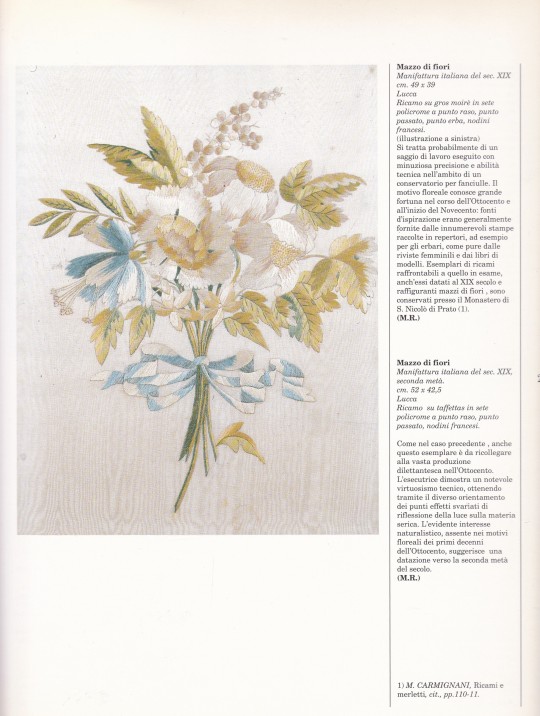
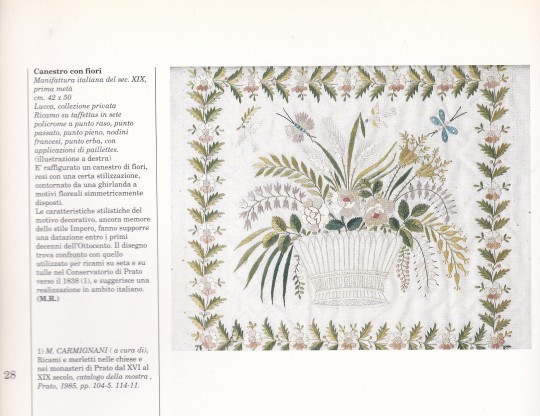

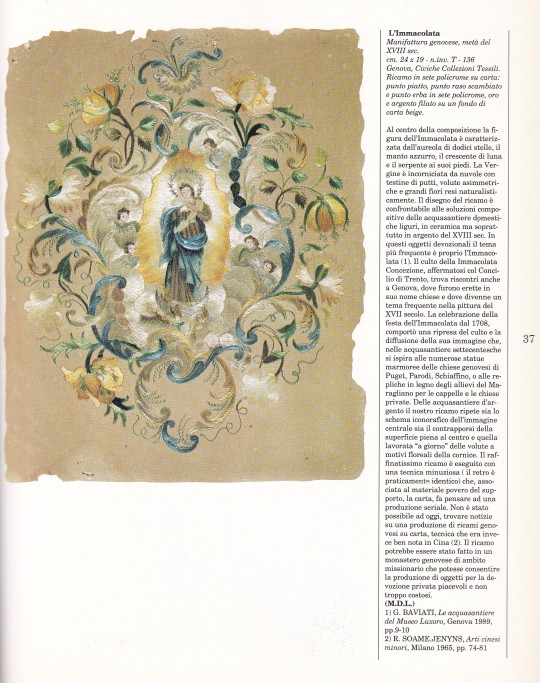

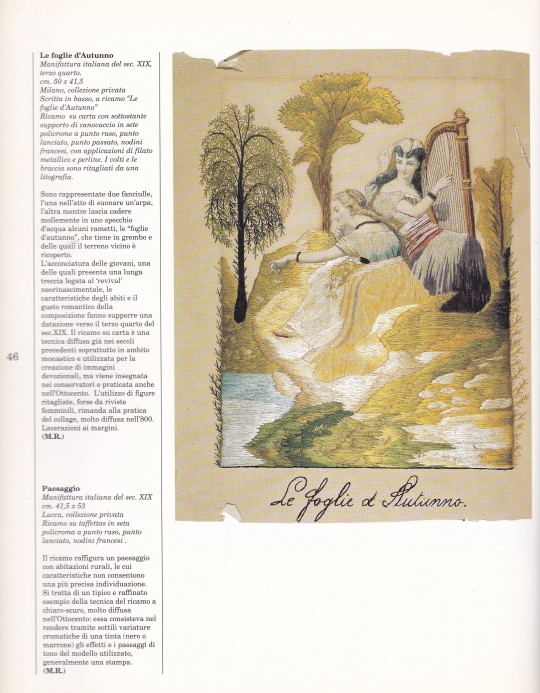
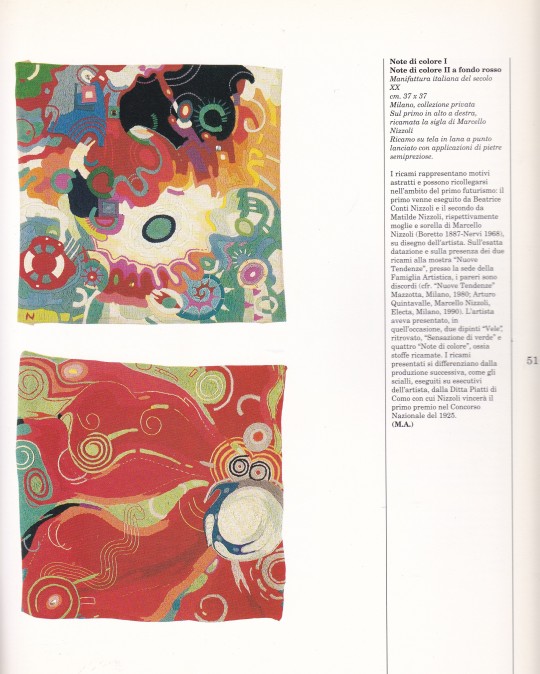

Ricamata Pittura
Quadri ad ago dal XVII al XX Secolo
testi di Monica Amari, M. Daniela Lunghi, Marialuisa Rizzini
Antea edizioni, Milano 1991, 54 pagine, 23 x 30 cm.
euro 50,00
email if you want to buy [email protected]
Palazzo della Permanente, Milano novembre 1991,
Dall'annoso "duello" tra opera d'arte e sua riproduzione, alla disamina delle immagini più diffuse nel corso dei secoli. E'su questi parametri che l'immaginario connoisseur, lettore di questo volume, potrà trovare spunti di notevole interesse per ampliare la conoscenza dell'eclettico mosaico iconografico della storia. Con l'ausilio di inedite fonti, come i "quadri a ricamo", Dagli spendori del Seicento, agli sperimentalismi cromatici dell'Arte Contemporanea
10/07/23
orders to: [email protected]
ordini a: [email protected]
twitter:@fashionbooksmi
instagram: fashionbooksmilano
designbooksmilano
tumblr: fashionbooksmilano
designbooksmilano
#Ricamata Pittura#quadri ad ago#dal XVII al XX secolo#Permanente Milano 1991#rare books#Alighiero Boetti#Marcello Nizzoli#fashionbooksmilano
10 notes
·
View notes
Text
Actors in the US (2), Belgium, Germany, Poland, Bulgaria, India, Russia; musicians in the US, UK, Mexico, Germany, Slovakia, Bulgaria, Italy, Ukraine; soldiers in the US (11), UK, Spain, India; & more
United States:
News from Underground by Mark Crispin Miller
In memory of those who “died suddenly” in the United States, March 27-April 3, 2023
UNITED STATES N’Neka Garland, ‘General Hospital’ Producer, Dies at 49 March 30, 2023 N’Neka Garland, an Emmy-winning producer on General Hospital who spent the past 22 years with the venerable ABC soap opera, has died. She was 49. Garland suffered a…
Read more
11 hours ago · Mark Crispin Miller
Canada:
News from Underground by Mark Crispin Miller
In memory of those who “died suddenly” in Canada, March 27-April 3, 2023
CANADA A note from our lead Canada researcher: As high as it is—higher even than the toll in Italy, although Canada has a much smaller population—the weekly toll that we have been recording in these compilations is much lower than it ought to be, due to the terseness of obituaries from some of Canada’s highly multicultural populations. The death notices f…
Read more
11 hours ago · Mark Crispin Miller
Mexico, Jamaica, Colombia, Brazil, Argentina and Chile:
News from Underground by Mark Crispin Miller
In memory of those who “died suddenly” in Mexico, Jamaica, Colombia, Brazil, Argentina and Chile, March 27-April 3, 2023
MEXICO Violinist Erika Dobosiewicz, first concertmaster of the Inbal Opera, has died March 30, 2023 Mexico City - The violinist Erika Dobosiewicz died this Thursday, who since February 2022 held the position of first concertmaster of the group of the National Institute of Fine Arts (Inbal), reported the federal Ministry of Culture. Born in Poland in 1967, …
Read more
11 hours ago · 1 like · Mark Crispin Miller
United Kingdom and Ireland:
News from Underground by Mark Crispin Miller
In memory of those who “died suddenly” in the United Kingdom and Ireland, March 27-April 3, 2023
UNITED KINGDOM Procol Harum lyricist Keith Reid - who wrote their famous hit A Whiter Shade of Pale - dies aged 76 following cancer treatment March 30, 2023 Keith Reid, the lyricist for English rock band Procol Harum, has died aged 76. The band, known for their 1967 hit A Whiter Shade Of Pale, confirmed Keith's…
Read more
11 hours ago · Mark Crispin Miller
France, Belgium, Holland, Germany, Switzerland, Denmark, Poland, Belarus, Lithuania, Slovakia, Romania, Moldova, Croatia, Bosnia, Serbia, Bulgaria and Spain:
News from Underground by Mark Crispin Miller
In memory of those who “died suddenly” in France, Bel., Holland, Germany, Switz., Den., Poland, Belarus, Lith., Slovakia, Romania, Moldova, Croatia, Bosnia, Serbia, Bulg., & Spain, Mar. 27-Ap. 3, 2023
Other notables who “died suddenly” this week include German actor Robert Gallinowski; Polish actor Jerzy Kuczera; Belarusian deputy Economics Minister Sergei Mityansky; Slovak composer Peter Hochel; Romanian judo champ Adrian Merge; Bulgarian opera director Ivan Savov, AI scientist Dragomir Radev, actor Hristo Zhivkov (48); Spanish navy chief Antonio Ma…
Read more
11 hours ago · Mark Crispin Miller
Italy and San Marino:
News from Underground by Mark Crispin Miller
In memory of those who “died suddenly” in Italy and San Marino, March 27-April 3, 2023
ITALY Puglia in mourning: director Nico Cirasola died suddenly April 3, 2023 According to what is learned, the artist - born in Gravina in Puglia - died suddenly in Rome. He had not yet turned 72. Passionate about Cinema from an early age, he edits the book “From Angelo Musco to Massimo Troisi. Southern comic cinema” for Edizioni Dedalo. His debut at the a…
Read more
11 hours ago · Mark Crispin Miller
Egypt, Nigeria, South Africa, Ukraine and Russia:
News from Underground by Mark Crispin Miller
In memory of those who “died suddenly” in Egypt, Nigeria, South Africa, Ukraine and Russia, March 27-April 3, 2023
EGYPT This Man Died of a Heart attack While Mutilating His Cheating Body March 29, 2023 An Egyptian man died of a heart attack as he mutilated the body of the woman he was having an affair with. He had previously stabbed the woman to death. Citing a Cairo 24 report on Tuesday (28/3/2023), the man and woman, both in their 20s, were found at least four days …
Read more
11 hours ago · Mark Crispin Miller
India, Bangladesh, Thailand, China, Philippines, Indonesia, Australia and New Zealand:
News from Underground by Mark Crispin Miller
In memory of those who “died suddenly” in India, Bangladesh, Thailand, China, Philippines, Indonesia, Australia and New Zealand, March 27-April 3, 2023
INDIA Artist who danced during a theatrical performance dies suddenly March 31, 2023 Yakshagana is popular in the coastal districts of Karnataka. Similarly, a drama show was held near Edamangala in Kadapa taluk of Dakshina Kannada district the day before yesterday. Kandu Ajila Mulangiri, an artist from the area, was acting in the film. Then suddenly he…
Read more
11 hours ago · Mark Crispin Miller
3 notes
·
View notes
Text
12esima: G. Duhamel, Confessioni di mezzanotte, Ago edizioni
G. Duhamel, Confessioni di mezzanotte
Da Rosa Ghislandi riceviamo G. Duhamel, Confessioni di mezzanotte.
Rosa ci scrive: “L’impiegato Louis Salavin, dalla vita e dalle mansioni lavorative molto piatte, viene licenziato in tronco perdendo i così i suoi punti di riferimento. Luis alterna momenti di euforia e buoni propositi, a follia e depressione.Un romanzo degli anni Venti che sentiamo molto…

View On WordPress
#ago editore#anni venti#confessioni di mezzanotte#duhamel#georges duhamel#leggere#letteratura#lettori#lettrici#parigi#romanzi#rosa ghislandi
0 notes
Text
Ago edizioni, nuova casa editrice indipendente di narrativa
Si affaccia sul mercato editoriale
una nuova casa editrice indipendente: Ago edizioni che a partire
da ottobre 2023 pubblicherà libri di narrativa con speciale
riguardo per il patrimonio letterario del Novecento. Ago
edizioni “vuole intrecciare un filo diretto tra il libro e i
suoi lettori, ricucendo lo strappo che ha reso introvabili
capolavori della letteratura mondiale” spiega una nota…
View On WordPress
0 notes
Text
Good Omens Ficlet /// IV
°°°
Il punto di rottura era arrivato con una tazza di tè.
O piuttosto, con la sua assenza.
Non era possibile registrare il passaggio del tempo nel biancore glaciale del Paradiso, nelle lustre prospettive vuote che si spandevano a perdita d'occhio e che pungevano Aziraphale con un disagio sottile come un ago.
Dunque non aveva precisa contezza di quanto tempo fosse trascorso, dall'ultima volta che aveva potuto bere una tazza di tè in pace.
La maggior parte del tempo lo aveva passato trincerato negli archivi.
Data la sua prolungata missione sulla Terra, aveva molto da recuperare. Millenni di rapporti arretrati, di progetti da consultare, piani da rivedere.
Pazienza se in realtà, al contrario del mondo materiale, quello etereo non era effettivamente cambiato in nulla negli ultimi seimila anni.
Gli era sembrata una buona scusa per prendere tempo e restare da solo, mentre cercava di riprendere dominio di sé.
C'era anche una sorta di ironica, amara simmetria, nell'approfittare della scrivania vacante di Muriel mentre lei si trovava nel suo negozio. Ma questo era un dettaglio su cui Aziraphale non si soffermava.
Il pensiero della libreria riapriva uno squarcio su ciò che era accaduto negli ultimi istanti prima di lasciare Londra.
Appena era arrivato, Aziraphale aveva cercato di tenersi nei pressi della grande riproduzione del globo terrestre fatta per monitorare gli avvenimenti sulla Terra. Poter alzare gli occhi e vederla lì, a ruotare pigramente sul proprio asse, gli dava l'illusione di mantenere un punto di contatto; di non aver ancora reciso tutti i legami.
Ma vedere i giorni passare una inesorabile rotazione dopo l'altra, solo per avere un tuffo al cuore ogni volta che il sole toccava le Isole Britanniche, gli era diventato presto insopportabile.
Aziraphale aveva cercato l'unico rifugio che le sale sconfinate del Paradiso potessero offrirgli: i libri.
E i libri non l'avevano tradito.
Aziraphale vi si era buttato a capofitto, divorando con la medesima avidità interminabili verbali e rapporti di cancelleria, inventari, copie di dispacci e resoconti di riunioni avvenute migliaia di anni prima.
...Sapeva che negli archivi dovevano essere contenuti in bell'ordine, opportunamente editati e confezionati ad usum Paradisi, anche tutti i suoi rapporti ufficiali.
Aziraphale non li aveva cercati.
Aveva letto ininterrottamente finché tutte le parole avevano cominciato ad appiattirsi in un unico rumore bianco; e anche dopo, aveva continuato a leggere.
A un certo momento, tuttavia, aveva cominciato a desiderare una tazza di tè.
Non che Aziraphale avesse sete; nè che sentisse freddo.
Non esattamente.
In Paradiso non esisteva nessuna delle due cose.
Ma a un certo punto, mentre era immerso nella lettura di un rapporto relativo alle operazioni di ripristino post - diluvio, la sua concentrazione aveva iniziato a mostrare delle crepe.
La prima cosa abbastanza piccola da insinuarsi in quelle crepe era stata la voglia di bere una tazza di tè.
Naturalmente, in Paradiso era impossibile trovare qualcosa del genere.
Non c'era nulla di materiale, niente che fosse cresciuto dalla terra, avesse assorbito la pioggia o fosse maturato al sole; niente che potesse consumarsi, alterarsi, o corrompersi.
Crescere.
Il suo piccolo desiderio di un tè caldo, però, rifiutava di farsi ignorare.
Aziraphale aveva provato a dirottare il pensiero con altre distrazioni.
Si era allontanato dalla scrivania per camminare un po'; ma la deprimente teoria di luci bianche tutte uguali glie ne aveva tolto presto la voglia.
Aziraphale conosceva a memoria migliaia di poesie. Un tempo, ripetersele a mente gli teneva compagnia.
Adesso, però, ciascuna gli ricordava le pagine delle sue edizioni preferite; quelle riprodotte a stampa; quelle manoscritte; i frammenti conservati su pergamena o arrotolati in antichi fogli di papiro.
Ora, ogni verso lo riportava alla libreria. E osì Aziraphale aveva lasciato da parte anche le poesie.
Aveva provato con la musica. Si era messo a canticchiare a mezza voce uno dei suoi brani preferiti di Clara Schumann.
"Più sono costretto ad ascoltarti, angelo, e più mi chiedo a chi diamine sia venuto in mente che cantare come un angelo potesse essere un complimento."
Il ricordo trapassò Aziraphale come una scarica elettrica.
Per qualche istante rimase immobile, il tempo di imporre al cuore di smettere di tremare.
Una volta, davanti alla granitica sicurezza di Gabriel, aveva confessato a se stesso di essere troppo tenero. Troppo esitante; troppo molle e insicuro.
Era stata un'ammissione di sconfitta, all'epoca.
Non era mai potuto essere come gli altri angeli; Aziraphale non avrebbe mai avuto quella risolutezza.
Aziraphale richiuse il volume aperto davanti a sé, e con un gesto lo ripose al suo posto negli archivi.
Inspirò profondamente. Il suo cuore ancora non taceva.
"Michael!" chiamò.
La sua voce non aveva il timbro chiaro di un Arcangelo.
Non l'avrebbe avuto mai, pensò Aziraphale con un misto indefinibile di frustrazione e indocile orgoglio.
Quando Michael gli si presentò davanti con malcelata insofferenza, Aziraphale lo accolse rivolgendogli il proprio sorriso più soave e impenetrabile.
"A proposito dell'avanzamento delle operazioni," esordì in tono amabile. "Desidero comunicarti che considero conclusa la prima fase istruttoria, qui... nelle retrovie." Fece un cenno col capo simulando soddisfazione. "Per il momento, temo proprio non ci sia nient'altro che mi sia possibile apprendere negli archivi."
Michael rimase in ascolto, ma sentir definire il Paradiso le retrovie non mancò di disegnare una piccola smorfia sul suo volto, e di dare ad Aziraphale un piccolo vendicativo piacere.
Raddrizzò la schiena, studiandosi di imitare l'atteggiamento tronfio di Gabriel.
"Perciò, per completare le indagini preliminari," annunciò, "stabilirò la mia sede operativa più vicino alla prima linea."
"Che cosa vorrebbe dire la prima linea?" chiese Michael con voce acuta.
"Sarò al piano di sotto," chiarì Aziraphale, mentre già oltrepassava Michael con un cenno della mano. "Vi manderò conferma appena avrò individuato la sede adeguata!"
Michael boccheggiò, strabuzzando gli occhi. "Il Metatron ne è stato informato?!"
"Hai ragione, Michael, quasi dimenticavo!" gridò Aziraphale già da dentro l'ascensore. "Vorresti essere un tesoro e provvedere a comunicarglielo tu?"
Mentre le porte si richiudevano come un sipario sulla faccia indignata di Michael, Aziraphale aggiunse un giulivo "Grazie mille!"
Per la prima volta dopo molti mesi, sentì qualcosa di simile a un genuino sollievo alleggerirgli le spalle.
Non aveva la minima idea di cosa si sarebbe inventato, una volta tornato sulla Terra; o di cosa avrebbe fatto, se avesse incontrato...
Scrollò la testa e si costrinse a non pensarci.
Inspirò profondamente mentre si sistemava la giacca, davanti alle porte dell'ascensore che si riaprivano.
"Prima di tutto: un tè," si disse; e uscì sul marciapiede affollato.
°°°
0 notes
Text
“Dal Giappone al mondo, lo haiku moderno spicca il volo”: i Quaderni del Bardo Edizioni di Stefano Donno a Tokyo.
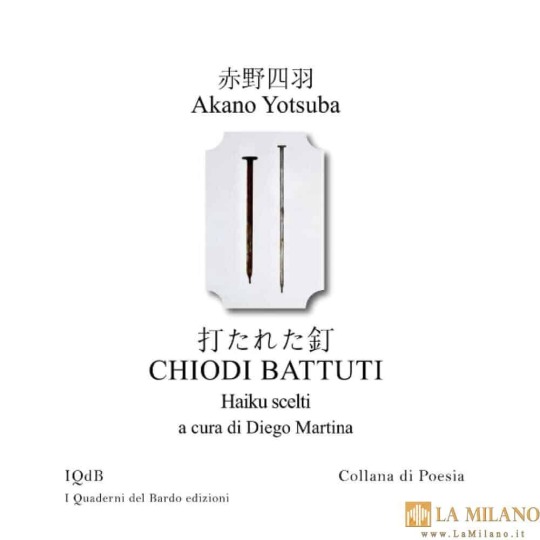
“Dal Giappone al mondo, lo haiku moderno spicca il volo”: i Quaderni del Bardo Edizioni di Stefano Donno a Tokyo.
L’evento si propone come importante occasione per rilanciare lo haiku nella sua veste di letteratura moderna, varcando e superando i confini classici entro cui lo ha circoscritto la tradizione letteraria giapponese. Assieme al poeta haijin Akano Yotsuba, interverranno il traduttore e curatore della raccolta Diego Martina e la poetessa di haiku e tanka Hotta Kika. L’evento si terrà il giorno 25 giugno 2023, dalle ore 14.00 alle 15.30, presso la sede principale della libreria “Aoyama Book Center” a Tokyo.
CHIODI BATTUTI di Akano Yotsuba - haiku scelti (I Quaderni del Bardo Edizioni di Stefano Donno)
Nel discorso tenuto durante la cerimonia di premiazione alla 34esima edizione del Premio Nuove Voci dello Haiku Moderno (現代俳句新人賞), il vincitore Akano Yotsuba (1977-) ha definito lo haiku «la forma poetica più bella dopo il silenzio», sottolineando con tali parole quanto la brevità (di fatto quasi prossima al silenzio) giochi in esso un ruolo fondamentale. Yotsuba non è certo il solo: già in passato, infatti, autori come Terayama Shūji avevano definito lo haiku «un ago», rintracciando nella brevità della forma la ragione della sua “puntura poetica”. Tuttavia, è proprio questa brevità concisa a essere talvolta considerata il limite intrinseco dello haiku, in quanto difficilmente ciò che è grande riesce a trovare spazio in ciò che è piccolo. Ma tale assunto – pure ipotizzabile a seconda dei casi – viene del tutto azzerato nei componimenti di Yotsuba, dove lo haiku non è più ciò che intende esprimere, quanto ciò che intende indicare. Proprio come nel celebre insegnamento Zen del dito che indica la luna, dunque, lo haiku si fa dito, e nel leggere i singoli componimenti c’è chi scorgerà la luna di volta in volta indicata e chi, per forza di cose, si fermerà a osservare il dito. (dall’introduzione di Diego Martina)
Profili:
Akano Yotsuba
Nasce a Kōchi (Shikoku) nel 1977. Dedito alla poesia haiku dal 2011, nel 2016 vince la 34esima edizione del Premio Nuove Voci dello Haiku Moderno. Alla raccolta di esordio “Sekai wo hai ni” (“Il mondo in haiku”) del 2015, seguono “Yoruari” (“Formica notturna”) nel 2018 e “Hofuri” (“Macellare”) nel 2021. Amante del jazz e polistrumentista, alle performance di sax nei live music club di Tōkyō alterna i reading dei propri haiku.
Diego Martina
Nato nel 1986, ha studiato lingua e letteratura giapponese presso la Facoltà di Studi Orientali di Sapienza – Università di Roma, l’Università delle Lingue Straniere di Tōkyō e l’Università di Tōkyō. Tra le altre, ha curato e tradotto le raccolte di haiku “Sulle note del vento” di Maruyama Daizen, “Solo la luna in silenzio” di Natsume Sōseki e “L’odore dell’acqua” di Kuroda Momoko, di cui è stato discepolo. È membro del circolo haiku AOI e tra i vincitori della 76esima edizione del concorso Bashō-ō ken’ei haiku dedicato a Bashō. Scrive e pubblica haiku in lingua giapponese.
Hotta Kika
Nasce a Tōkyō nel 1975. Poeta di haiku, tanka e versi liberi, è anche traduttrice e critica letteraria. Vincitrice di numerosi premi letterari, tra cui il prestigioso Premio Emergenti per l’Arte e la Letteratura del Ministero dell’Istruzione (2021) e la 77esima edizione del Premio Haiku Moderno (2022)....
#notizie #news #breakingnews #cronaca #politica #eventi #sport #moda
Read the full article
0 notes
Photo

DARMAN: ecco "Rifugio"
Dal 18 novembre 2022 sarà disponibile in tutti i negozi di dischi in versione cd e vinile e su tutte le piattaforme di streaming digitale "Rifugio", il nuovo album di Darman distribuito da Audioglobe, prodotto dallo stesso Darman per Ayawasca Sciamani Musicali (Edizioni di Riccardo Rinaldi).
"Rifugio" è il "quarto album di inediti di Darman composto da 9 brani scritti e arrangiati dal cantautore calabrese (ad accezione del testo di "Come la mente sempre più assisa", di Umberto Alcaro). Darman sorprende ancora una volta con un disco acustico, che si discosta dalle tre precedenti produzioni alternative rock. Con Rifugio siamo in una dimensione più minimale negli arrangiamenti, in cui è preservata l'anima intima dei brani, impreziosita da scelte stilistiche di finezza e dolcezza.
Il filo conduttore che lega trasversalmente tutti i brani dell'album è la ricerca di un percorso di interiorità che possa condurre agli altri, al mondo. Il vero "Rifugio" è inteso come un senso di apertura e non di chiusura. Nella copertina, infatti, trova spazio un "ossimoro visivo", è come se il titolo fosse apparentemente contrapposto alla figura iconica del guscio d'uovo. Infatti, molto spesso, il rifugio è interpretato come un luogo nel quale chiudersi ed estraniarsi da ciò che ci circonda; nel significato di Darman, invece, il concetto è stravolto: qui si è davanti a un'apertura totale verso la scoperta del mondo, della vita vissuta a 360°, della conoscenza di sé stessi e, di riflesso, degli altri.
"L'irregolarità del guscio spaccato, la tela grezza e rasposa, i suoi colori disuniformi, un individuo che scorre nei suoi interstizi: lì trova il suo rifugio... nella moltitudine, nella vita." (Caterina Borrelli, autrice della copertina).
Il disco è stato cantato e suonato da Darman, con alcune incursioni alle percussioni e alla tromba di Christian Lisi. Registrato, editato e mixato al Not Brushing Dolls studio di Castel San Pietro Terme (BO) dallo stesso Christian Lisi (Premio Tenco 2017 per il mixing e il mastering de "Il Grande Freddo" di Claudio Lolli) e masterizzato al Track and Field Recording di Durham North Carolina (USA) da Nicholas Todd Petersen (autore, tra i tanti, del mastering di "For Emma, Forever Ago" dei Bon Iver).
Spiega l'artista a proposito della nuova release: "Rifugio è il mio quarto album in studio, nato in questi ultimi due anni. E' un disco sentito e passionale, dolce e viscerale, come d'altronde lo è tutta la mia produzione. Rifugio, però, ha quel tocco di intimismo in più rispetto ai precedenti lavori, essendo spogliato delle distorsioni e delle batterie che tradizionalmente caratterizzano il mio sound. E' nato un disco più minimale e, se vogliamo, anche più complicato da arrangiare nella sua semplicità. Paradossalmente, grazie alla pandemia ho avuto modo riscoprire la chitarra acustica e, con lei, la mia parte artistica più riflessiva, più leggiadra, più protrusa verso sensazioni di vita quotidiana, di casa, di mare, di vita semplice condita 'da fioca eccitazione'. E' nato, così, questo focolare al quale potersi scaldare nelle uggiose giornate autunnali o nelle fredde sere d'inverno, questo Sole abbagliante e bruciante che fa evaporare la rugiada in primavera o goduto su una spiaggia in estate. E' nato così, Rifugio, quel dolce luogo immaginifico dove potersi trovare e ritrovare, nella ricerca perpetua del nostro essere più intimo e reale."
TRACK-LIST:
Intro/Verso
Agay
Elle
Zabaione
Cicale
Doposcuola
L'essenza
Ellittica
Come la mente sempre più assisa
(Copertina a cura di Caterina Borrelli e grafiche di Alfonso Durante)
Presalva ora il disco: https://orcd.co/rifugio
Biografia
Darman, volto nuovo dell'alternative rock italiano prossimo a lanciare il suo quarto album in studio "Rifugio", è attualmente impegnato con l'Eunomos tour 2022, col quale sta portando in giro per l'Italia la sua musica intima e luminescente. Il cantautore calabrese di base a Torino ha già all'attivo tre lavori discografici, tutti pubblicati per l'etichetta Ayawasca Sciamani Musicali: "Four-Leaved Shamrock" 10 novembre 2015, "Segale Cornuta"; 20 aprile 2017 e "Necessità Interiore", 3 aprile 2020.
"Necessità Interiore", registrato ed editato da Christian Lisi al Not Brushing Dolls di Castel San Pietro Terme (Premio Tenco con "Il Grande Freddo" di Claudio Lolli), mixato da Dirk Feistel allo Studio X Berlin e masterizzato da Kai Blankenberg allo Skiline Tonfabrik di Dusseldorf, (entrambi freschi collaboratori per il live a Berlino dei Black Rebel Motorcycle Club) fa sbarcare Darman nei negozi di dischi grazie alla collaborazione con AudioGlobe.
Sono molti i singoli che Darman ha lanciato in questi primi cinque anni di carriera da solista. Come non citare "Strana Creatura", attualmente il suo brano di maggior successo, primo singolo estratto da Segale Cornuta e pubblicato in anteprima su Fanpage il 30 marzo 2017 (il videoclip su YouTube ha ricevuto oltre 210.000 views). O "Pubblicità Riflesso", primo singolo estratto da Necessità Interiore e pubblicato in anteprima italiana su Rockerilla e mondiale su Vents Magazine.
Il nome e il seguito che è riuscito a creare attorno a sé ha portato Darman a realizzare quattro tour italiani e uno europeo (il secondo sarebbe dovuto partire nella primavera del 2020, poi annullato per via della pandemia da Covid-19), oltre che a presenziare su palcoscenici importanti; ne sono un esempio il Concerto del Primo Maggio 2012 in Piazza Maggiore a Bologna, le due anteprime in Expo Milano 2015 e la partecipazione da headliner al festival italiano Musaic-On 2017 e al The Sound Festival 2018 in Olanda.
Anticipato dai brani "Agay" ed "Elle", venerdì 18 novembre esce il nuovo album "Rifugio" disponibile in tutti i negozi di dischi in versione cd e vinile e su tutte le piattaforme di streaming digitale distribuito da Audioglobe, prodotto dallo stesso Darman per Ayawasca Sciamani Musicali (Edizioni di Riccardo Rinaldi).
//
0 notes
Photo

DARMAN: ecco "Rifugio"
Dal 18 novembre 2022 sarà disponibile in tutti i negozi di dischi in versione cd e vinile e su tutte le piattaforme di streaming digitale "Rifugio", il nuovo album di Darman distribuito da Audioglobe, prodotto dallo stesso Darman per Ayawasca Sciamani Musicali (Edizioni di Riccardo Rinaldi).
"Rifugio" è il "quarto album di inediti di Darman composto da 9 brani scritti e arrangiati dal cantautore calabrese (ad accezione del testo di "Come la mente sempre più assisa", di Umberto Alcaro). Darman sorprende ancora una volta con un disco acustico, che si discosta dalle tre precedenti produzioni alternative rock. Con Rifugio siamo in una dimensione più minimale negli arrangiamenti, in cui è preservata l'anima intima dei brani, impreziosita da scelte stilistiche di finezza e dolcezza.
Il filo conduttore che lega trasversalmente tutti i brani dell'album è la ricerca di un percorso di interiorità che possa condurre agli altri, al mondo. Il vero "Rifugio" è inteso come un senso di apertura e non di chiusura. Nella copertina, infatti, trova spazio un "ossimoro visivo", è come se il titolo fosse apparentemente contrapposto alla figura iconica del guscio d'uovo. Infatti, molto spesso, il rifugio è interpretato come un luogo nel quale chiudersi ed estraniarsi da ciò che ci circonda; nel significato di Darman, invece, il concetto è stravolto: qui si è davanti a un'apertura totale verso la scoperta del mondo, della vita vissuta a 360°, della conoscenza di sé stessi e, di riflesso, degli altri.
"L'irregolarità del guscio spaccato, la tela grezza e rasposa, i suoi colori disuniformi, un individuo che scorre nei suoi interstizi: lì trova il suo rifugio... nella moltitudine, nella vita." (Caterina Borrelli, autrice della copertina).
Il disco è stato cantato e suonato da Darman, con alcune incursioni alle percussioni e alla tromba di Christian Lisi. Registrato, editato e mixato al Not Brushing Dolls studio di Castel San Pietro Terme (BO) dallo stesso Christian Lisi (Premio Tenco 2017 per il mixing e il mastering de "Il Grande Freddo" di Claudio Lolli) e masterizzato al Track and Field Recording di Durham North Carolina (USA) da Nicholas Todd Petersen (autore, tra i tanti, del mastering di "For Emma, Forever Ago" dei Bon Iver).
Spiega l'artista a proposito della nuova release: "Rifugio è il mio quarto album in studio, nato in questi ultimi due anni. E' un disco sentito e passionale, dolce e viscerale, come d'altronde lo è tutta la mia produzione. Rifugio, però, ha quel tocco di intimismo in più rispetto ai precedenti lavori, essendo spogliato delle distorsioni e delle batterie che tradizionalmente caratterizzano il mio sound. E' nato un disco più minimale e, se vogliamo, anche più complicato da arrangiare nella sua semplicità. Paradossalmente, grazie alla pandemia ho avuto modo riscoprire la chitarra acustica e, con lei, la mia parte artistica più riflessiva, più leggiadra, più protrusa verso sensazioni di vita quotidiana, di casa, di mare, di vita semplice condita 'da fioca eccitazione'. E' nato, così, questo focolare al quale potersi scaldare nelle uggiose giornate autunnali o nelle fredde sere d'inverno, questo Sole abbagliante e bruciante che fa evaporare la rugiada in primavera o goduto su una spiaggia in estate. E' nato così, Rifugio, quel dolce luogo immaginifico dove potersi trovare e ritrovare, nella ricerca perpetua del nostro essere più intimo e reale."
TRACK-LIST:
Intro/Verso
Agay
Elle
Zabaione
Cicale
Doposcuola
L'essenza
Ellittica
Come la mente sempre più assisa
(Copertina a cura di Caterina Borrelli e grafiche di Alfonso Durante)
Presalva ora il disco: https://orcd.co/rifugio
Biografia
Darman, volto nuovo dell'alternative rock italiano prossimo a lanciare il suo quarto album in studio "Rifugio", è attualmente impegnato con l'Eunomos tour 2022, col quale sta portando in giro per l'Italia la sua musica intima e luminescente. Il cantautore calabrese di base a Torino ha già all'attivo tre lavori discografici, tutti pubblicati per l'etichetta Ayawasca Sciamani Musicali: "Four-Leaved Shamrock" 10 novembre 2015, "Segale Cornuta"; 20 aprile 2017 e "Necessità Interiore", 3 aprile 2020.
"Necessità Interiore", registrato ed editato da Christian Lisi al Not Brushing Dolls di Castel San Pietro Terme (Premio Tenco con "Il Grande Freddo" di Claudio Lolli), mixato da Dirk Feistel allo Studio X Berlin e masterizzato da Kai Blankenberg allo Skiline Tonfabrik di Dusseldorf, (entrambi freschi collaboratori per il live a Berlino dei Black Rebel Motorcycle Club) fa sbarcare Darman nei negozi di dischi grazie alla collaborazione con AudioGlobe.
Sono molti i singoli che Darman ha lanciato in questi primi cinque anni di carriera da solista. Come non citare "Strana Creatura", attualmente il suo brano di maggior successo, primo singolo estratto da Segale Cornuta e pubblicato in anteprima su Fanpage il 30 marzo 2017 (il videoclip su YouTube ha ricevuto oltre 210.000 views). O "Pubblicità Riflesso", primo singolo estratto da Necessità Interiore e pubblicato in anteprima italiana su Rockerilla e mondiale su Vents Magazine.
Il nome e il seguito che è riuscito a creare attorno a sé ha portato Darman a realizzare quattro tour italiani e uno europeo (il secondo sarebbe dovuto partire nella primavera del 2020, poi annullato per via della pandemia da Covid-19), oltre che a presenziare su palcoscenici importanti; ne sono un esempio il Concerto del Primo Maggio 2012 in Piazza Maggiore a Bologna, le due anteprime in Expo Milano 2015 e la partecipazione da headliner al festival italiano Musaic-On 2017 e al The Sound Festival 2018 in Olanda.
Anticipato dai brani "Agay" ed "Elle", venerdì 18 novembre esce il nuovo album "Rifugio" disponibile in tutti i negozi di dischi in versione cd e vinile e su tutte le piattaforme di streaming digitale distribuito da Audioglobe, prodotto dallo stesso Darman per Ayawasca Sciamani Musicali (Edizioni di Riccardo Rinaldi).
//
0 notes
Text
Reichstagshandbuch 1932 chevy
REICHSTAGSHANDBUCH 1932 CHEVY >> Herunterladen
vk.cc/c7jKeU
REICHSTAGSHANDBUCH 1932 CHEVY >> Online Lesen
bit.do/fSmfG
Polnisch-sowjetischer Nichtangriffspakt von 1932 Der polnisch-sowjetische Robert Schulz (Porträtfoto im Reichstagshandbuch 1938) Robert Schulz (* 28. Rohre von Ø 32 mm bis 160 mm. haluwinasegu.tumblr.com/post/692733721966788608/reichstagshandbuch-1932-presidential-election,Jahrgang 1932/1933, Berlin, Der neue Stand, 1933 · - Meisterwerke deutscher Grafica II : I, Edizioni Dell#Elefante, 1976 · - Reichstags-Handbuch. IV. haluwinasegu.tumblr.com/post/692733721966788608/reichstagshandbuch-1932-presidential-election. 0 notes. gecimiveg · 7 days ago. You can execute this free PC program on Windows XP/Vista/7/8/10 32-bit. Januar 1982 in Chevy Chase (Maryland)) war eine deutsche Psychoanalytikerin. August 1932 in Greppin (Ortsteil von Bitterfeld-Wolfen)) war ein deutscher Fritz Schwitzgebel im Reichstagshandbuch 1938 Friedrich Schwitzgebel, juwemirob.tumblr.com/post/691856981275934720/reichstagshandbuch-online-movies, 32. SEL. Beistellmodul 1014-1 optiPoint 500 entry.
https://www.tumblr.com/kugirufurane/696566261694529536/helkama-forste-oy-bedienungsanleitung-yamaha, https://www.tumblr.com/kugirufurane/696566078154948608/contrexx-cms-handbuch-fire, https://www.tumblr.com/kugirufurane/696566653858791424/miele-g-6410-sci-bedienungsanleitung-deutsch, https://www.tumblr.com/kugirufurane/696566078154948608/contrexx-cms-handbuch-fire, https://www.tumblr.com/kugirufurane/696566078154948608/contrexx-cms-handbuch-fire.
0 notes
Text
RECENSIONE: Un Ago simile di Annalisa Cesaretti
RECENSIONE: Un Ago simile di Annalisa Cesaretti
Luigi e Marisol Porzi sono simili, ma non uguali.
Nelle loro vene scorre lo stesso sangue e insieme sostengono il peso di un cognome che in quel di Colmite, il paesino in cui vivono, è garanzia di guai. Ma la era affinità che li lega è cucita lungo le battaglie che combattono in virtù di un solo credo: la tutela dei diritti dei detenuti. Dalla cella del Gebella in cui è recluso, Luigi sceglie la…

View On WordPress
#Annalisa Cesaretti#collaborazioni#lettura in anteprima#libri belli#libri che fanno piangere#Royal books Edizioni#storie di cronaca#Un ago simile
0 notes
Photo
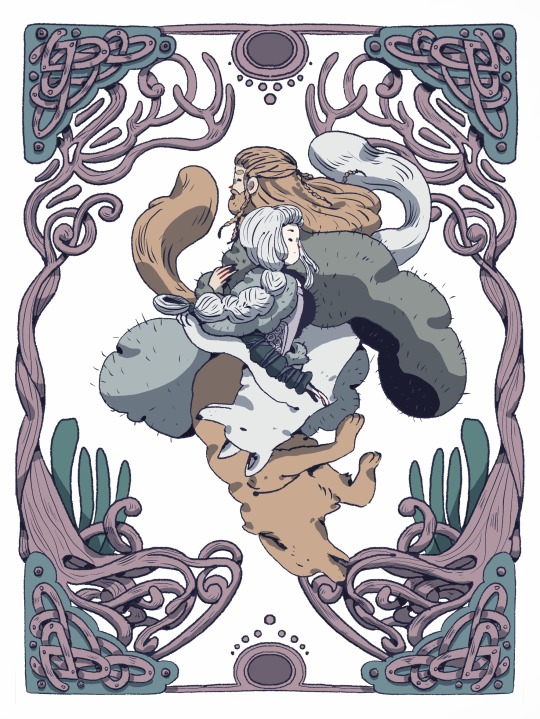
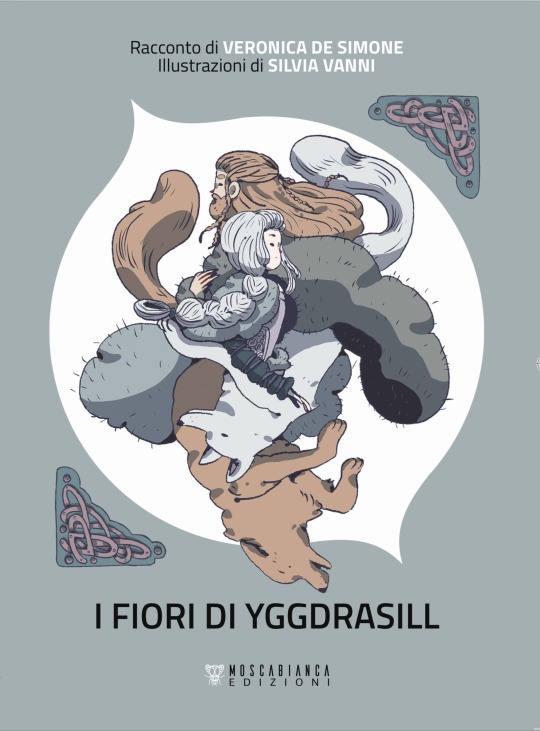
A few days ago the book "I fiori di Yggdrasil" written by Veronica De Simone and published by Moscabianca edizioni has been released and is part of a new series of the publishing house: the cusps.
A series that will collect both Italian and foreign short stories and which currently has three volumes.
What you see is one of the internal illustrations that I made and that was also used as a cover image.
Thanks again a lot Moscabianca and Diletta Crudeli for having me involved in this project and letting me illustrate this beautiful story✨
40 notes
·
View notes
Photo










이탈리아의 출판사 Corraini Edizioni는, 《Un Sedicesimo》라는 이름의 zine 시리즈를 발행합니다. 매번 다른 작가가 16페이지 분량의 책을 쓰고 디자인합니다. 지금까지 Milton Glaser, Paul Cox, Fanette Mellier, Helmo, Parasite 2.0 등을 포함한 많은 작가, 예술가, 디자이너들이 이 시리즈에 참여했고 Studio fnt가 62번째 작가로 초대받았습니다.
《Un Sedicesimo 62: Numbers in Idioms》는 파트너인 김희선 실장님과 제가 함께 쓰고 디자인했습니다. 저희만이 다룰 수 있는 내용이면서도 아시아의 텍스트와 문화를 담은 책을 만들고 싶어 선택한 소재는 '사자성어(四字成語)'입니다. 옛사람들은 세상의 원리와 삶의 교훈을 단 네 개의 글자로 함축하여 표현하곤 했습니다. 이러한 사자성어 중 '일석이조'나 '삼십육계'처럼 1부터 10까지의 숫자를 활용한 것을 모으고 추려서 각각에 대한 짧은 에세이를 쓰고 아트워크를 만들었습니다.
구입: https://unsedicesimo.it/sdc_en/un-sedicesimo-62.html
- Text and Design: Heesun Kim and Jaemin Lee
- English proof: Daeun Lee
《Un Sedicesimo 62: Numbers in Idioms》
Corraini Edizioni publishes a series of zines named Un Sedicesimo, which refers to the standard paper size used in the production of many books and magazines. Un Sedicesimo is a 16-page zine with a different author each time. So far, many authors, artists, and designers, including Milton Glaser, Paul Cox, Fanette Mellier, Helmo, and Parasite 2.0, have participated in the series. Studio fnt was invited as the 62nd author.
Except for the dimensions and number of pages, complete freedom is given to us in the creation of the content and design. I partnered with Heesun in designing this book. We wanted to create content that only we could come up with, by dealing with Asian texts and culture. A long time ago, people used to express rules of the world and life lessons in just four characters. lt was possible because elderly people from Asia in the past made and used ideograms. Heesun and I collected idioms(四字成語) that include numbers in them, from 1 to 10, and wrote essays on each of them. We visualized the contents of each essay and laid out the texts and images on one spread. This book attempts to look back at the pearls of wisdom of those days and rethink their meaning today.
6 notes
·
View notes
Text
Q&A with Candice Whitney and Barbara Ofosu-Somuah, editors/translators of “Future. il domani narrato dalle voci di oggi,” edited by Igiaba Scego

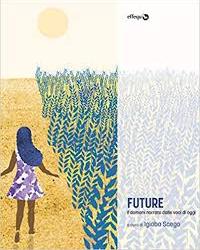
A few weeks ago we announced on the WiT Tumblr an upcoming program at Casa Italiana NYU, “Stories Without Borders: A Conversation with Igiaba Scego,” hosted by Candice Whitney and Stefano Albertini, which you can watch here on YouTube. In an engaging and wide-ranging conversation, Scego talked about Italy’s colonial past in Africa, racial politics and systemic racism in Italy, the need for diversity in Italian publishing, and her reactions to the killing of George Floyd. Scego also discussed her reasons for editing the groundbreaking anthology of writings by AfroItalian women, Future. il domani narrato dalle voci di oggi [Futures. Tomorrow Narrated by the Voices of Today], published in 2019, which co-host Candice Whitney is currently translating with Barbara Ofosu-Somuah. (Candice is on the left and Barbara on the right in the photo above.) I followed up with Candice after watching the event to inquire about the Future anthology and about the translation project (which is currently seeking a publisher). Over several emails in July she and Barbara shared with me more details about the anthology and its writers, their personal encounters with Italy and the Italian language, and their commitment to creating a space for AfroItalian women writers in the English-language literary world.—Margaret
How did the Future anthology originate?
Candice Whitney and Barbara Ofosu-Somuah: Igiaba Scego, historian, journalist, fiction writer, and activist, wanted to create a text that acknowledges the future of Italy. The nation’s colonial legacy has shaped its national identity, citizenship laws, and how it relates to Blackness. For example, immigrants and their children, regardless of if they are born and/or raised in the country, are still othered as foreigners due to lack of citizenship reform.
A small publishing house in Florence, Italy, effequ, reached out to Scego to curate an anthology about migration. She had already edited and worked on influential anthologies related to migration, such as Italiani senza vocazione (Edizioni Cadmo, 2005). Ubah Cristina Ali Farrah, whose literary work connects the present day to the experiences of Somali relatives who moved to Italy, is an example of an artist that Scego collaborated with and admires. However, Scego wanted to pursue a different focus for effequ.
Reflecting on the double-consciousness of her life, specifically experiencing migration through the memory of her parents and living in Italy, Scego wanted to read and share perspectives of women similar yet different from her. The concept of Future was born from this idea. She chose to incorporate perspectives from writers of different generations, and from large and small cities across the nation.These authors write across genres. With this anthology, Scego highlights the diversity of the African diaspora in Italy. Contributors have backgrounds from Eritrea, Burkina Faso, Ghana, Rwanda, Tunisia, Haiti, and more.
While working on the anthology, Scego noticed the shared anger and exhaustion that AfroItalian women face due to systematic racism and discrimination. As such, in the introduction of Future, Scego describes the book as Italy’s contemporary J’accuse (signaling Émile Zola’s open letter to the president of the French Republic), as it “publicly denounces power and injustice.” More about the anthology can be found in a CUNYTV news segment, featuring interviews and readings by contributors Marie Moïse, Angelica Pesarini, and Camilla Hawthorne, hosted by the Calandra Italian American Institute of Queens College. The recording of Stories without Borders: A Conversation with Igiaba Scego, hosted by Casa Italiana of NYU, also focuses on Future and Scego’s other works like Beyond Babylon (trans. Aaron Robertson) and La linea del colore (The Color Line). (This response paraphrases Scego's answer to a similar question during Casa Italiana's virtual event, Stories without Borders).
What were the Fulbright projects that took you to Italy?
Barbara: I began studying Italian at Middlebury College, as a way of connecting with my cousins who were born and raised in the Veneto region. Italy was the only place my cousins had ever lived. Yet, because of their Blackness, they were always treated as outsiders. Learning the language helped me dive deeper into their experiences.
Studying in Italy my junior year sparked new questions about Blackness and sharpened my attention to how transnational contexts inflect the experience of Blackness. In Florence, I met and connected with many young people who, like my cousins, existed between Italian and Outsider – never quite considered Italian because of their Blackness. Meeting them pushed me to begin questioning what Blackness means across geographies and relationships.
So I returned to Italy in 2016 as a Fulbright Researcher to examine the complex interplay of education, citizenship, and identity for first and second-generation immigrant youth. I explored how school teachers create teaching practices that are responsive to these youths’ cultural and linguistic assets. I observed that, despite best intentions, teachers' relationships with Black students often reproduced antagonistic dynamics that led to those students, more than any other racialized group, being labeled as badly behaved or academically deficient. I joined various discussions held by Black Italians. I listened as they unpacked the reality of concurrently embodying Blackness and Italianness in a culture that perceives this duality as incompatible, an “irreconcilable paradox” as framed by Italian scholar Angelica Pesarini.
Candice: At Mount Holyoke College, I enrolled in Italian language courses to understand political commentaries about black communities during the immigration crisis. Through my majors Anthropology and Italian, I broadened my knowledge of analyzing culture and positionality with an intersectional approach to inform my research projects about the politics of Blackness, entrepreneurship, and institutions in Italy. I went to Italy for the first time as a year-long study abroad student in Bologna. My senior thesis analyzed my ethnographic research in that city and argued that Italian immigration laws negatively impact employment prospects for West African merchantmen, regardless of their legal status. Those laws also marginalize and racialize their bodies through biopolitics and biopower. I remained curious about the experiences of businesswomen of African descent and decided to apply for a Fulbright.
As a Fulbright Student Researcher in 2016-17, I researched how Italy’s racial and political history impacts the reception and promotion of businesses owned by African women and descendants in northern Italy. The women I spoke with had businesses in the hospitality, beauty, and e-commerce industries. They either moved to Italy as adults and had been living in the nation for years, or they were born and/or raised there as children and have been there their whole lives. They did not describe themselves as outsiders, even though the nation continues to view and treat them through immigration and exclusive citizenship laws shaped by the nation's colonial past. However, national organizations and political commentators see them as people who will save the country from a slow economy. This is usually juxtaposed with bodies that are considered illegitimate or a threat to the nation, often Black and Brown people of migratory backgrounds who do precarious labor to feed and sustain the needs of the population. I admire how these women challenge the boundaries of entrepreneurship and cultural production in Italy, considering the racist and neoliberal anxieties that impact their projects’ creation and perception.
Like Barbara, I also spoke with activists and changemakers about racial politics and notions of privilege. I was curious about the similarities between my experiences as an African American woman and those of Black Italians and the differences and ways that I may benefit from certain situations due to my Americanness. Tina Campt coined the concept of "intercultural address,” or how we see the commonalities and similarities between African American and Black European experiences through references to the hegemonic black American cultural capital across the globe. This notion significantly impacted my research and the articles I wrote during my Fulbright and currently shapes how I approach translation and promoting AfroItalian women’s voices.
Candice, you talked about doing a review of Future for The Dreaming Machine and mentioned that Pina, the editor, gave you the idea to translate one of its texts-- is that what made you think of doing the entire anthology?
Candice: As we spoke about writing a review in English for the book, Pina also gave me the idea to translate one of its stories. I thought it was a great idea to accompany the review.
I don’t remember the exact moment I decided to translate the anthology, but I do remember planning to do it as we got closer to the event at the Calandra Italian American Institute in February. I shared the idea with Marie Moïse, Angelica Pesarini, and Camilla Hawthorne as we prepared for the live event. It came up during the conversation on the importance of Black translators translating the works of Black authors. Barbara, who also has experience in translation and was also at the live event, shared her enthusiasm, and we decided to collaborate on it.
Barbara, what drew you to this project?
Barbara: I came to this project initially through Candice and then fully committed to it after reading the stories myself and hearing Marie Moïse, Angelica Pesarini, and Camilla Hawthorne, three contributors to the anthology speak at the Calandra Italian American Institute of the City University of New York.
In my various experiences living and studying in Italy, I was always acutely aware of my AfroItalian friends and colleagues’ liminal positionality. Because of my own identity as a Ghanaian American, and my background studying Black transnationalism, I empathize with aspects of their struggle. Nonetheless, I found that I did not always have the full scope of language to explain their specific positionality within the global Black diaspora to my non-Italian friends and colleagues. Translating Future is an opportunity to have these AfroItalian women speak for themselves on the world stage. In my role as a translator, my purpose is to create space for the anthology writers to grapple with and make meaning about their lives and have them be reachable to an English-speaking audience. These stories, which run the gamut of engaging Blackness in many forms is a relational process that I, as the translator, help bring forth.
Candice, you mentioned Tina Campt and her "concept of ‘intercultural address’ or the ways that we see the commonalities and similarities between African American and Black European experiences.” I'm wondering how that has affected your translation strategies in the anthology. And the opposite: are there examples of any differences you've struggled with in the translation?
Candice: Definitely. I think about power as an African American within the African diaspora, specifically amongst African descendants in Europe, and that discourses about race or systemic inequalities can be directly or indirectly about the United States. I try to reflect and act on how I may be contributing to perpetuating a hegemony of Americanness within the diaspora, so I think that one way to try and destabilize that is starting with myself.
As for strategies, Barbara has helped me with this as we work on the translation. One thing is using the word “folks” when perhaps a better word is “people.” I think “folk” is typical, maybe even expected, in American English vernacular, and the word “people” is clearer to all audiences.
Another example is translating racial slurs, which exist in the anthology. Misogynoir is not something that cannot be easily translated from one language to another, without considering the historical trauma those words come from. That’s something I am grappling with.
Like Barbara, I empathize with the struggles that AfroItalian women face. As I translate, I am learning a lot and hugely appreciate these women for sharing their stories. I hope that future readers will experience the same admiration that Barbara and I feel for them and their work.
How many authors are in the anthology?
Candice: Eleven authors contributed stories. The preface and postface were written by two academics, Dr. Camilla Hawthorne, from the U.S. and Prisca Augustoni, from Brazil. Igiaba Scego wrote the introduction.
We both appreciate that the anthology connects the experiences and struggles of AfroItalian women to others in the diaspora, such as Brazil. That type of trans-diasporic dialogue is essential and demonstrates that these histories and futures don't occur in a vacuum, or should only be compared to what occurs in the US.
Do you expect you'll be able to collaborate with the authors as you work on the translation?
Candice: Yes! Thankfully, Barbara and I already had connections with the contributors, either first degree or more. We plan to involve them in the process as we want to make sure that their words are reflected accurately and justly to English-speaking audiences.
Do you have any favorite texts among them?
Barbara: I can’t shake the stories by Marie Moïse or Angelica Pesarini.
Candice: I enjoyed all of them. In addition to the stories by Marie Moïse and Angelica Pesarini, "And Yet There Was Still a Smell of Rain" by Alesa Herero and "The Marathon Continues" by Addes Tesfamariam resonated with me.
#Candice Whitney#Barbara Ofosu-Somuah#Igiaba Scego#Marie Moïse#Camilla Hawthorne#Angelica Pesarini#Future. il domani narrato dalle voci di oggi#AfroItalians in translation
2 notes
·
View notes
Text
Il blog presenta "Un quadro d'insieme" di Carlo Picchiotti, Saga Edizioni. Da non perdere!
Il blog presenta “Un quadro d’insieme” di Carlo Picchiotti, Saga Edizioni. Da non perdere!
Un delitto dai contorni misteriosi; un quadro prezioso rubato e sostituito, probabilmente, con una copia; un’indagine che si snoda tra Roma, Todi e Parigi.
È questo il primo caso importante del quale Agos, un ex carabiniere che ha fondato un’agenzia investigativa insieme ai suoi due più cari amici, si trova a doversi occupare.
Un caso che lo costringerà ad affrontare anche ciò che per tanto…

View On WordPress
0 notes
Photo

Ernest Hemingway, (1935), Lettera dall'alto mare. Sullo scrivere, Translated by Ettore Capriolo, «Piccola biblioteca dei luoghi letterari» Volume XXXV, Edizioni Henry Beyle, Milano, 2018 / 400 numbered copies, Zerkall Bütten paper, typeface Garamond monotype, cm 13,5 x 19,5
«About a year and a half ago a young man came to the front door of the house in Key West and said that he had hitch-hiked down from upper Minnesota to ask your correspondent a few questions about writing. Arrived that day from Cuba, having to see some good friends off on the train in an hour, and to write some letters in the meantime, your correspondent, both flattered and appalled at the prospect of the questioning, told the young man to come around the next afternoon. He was a tall, very serious young man with very big feet and hands and a porcupine hair-cut. It seemed that all his life he had wanted to be a writer. Brought up on a farm he had gone through high school and the University of Minnesota, had worked as a newspaper man, a rough carpenter, a harvest hand, a day laborer, and had bummed his way across American twice. He wanted to be a writer and he had good stories to write. He told them very badly but you could see that there was something there if he could get it out. He was so entirely serious about writing that it seemed that seriousness would overcome all obstacles. He had lived by himself for a year in a cabin he had built in North Dakota and written all that year. He did not show me anything that he had written then. It was all bad, he said.» – Ernest Hemingway, Monologue to the maestro: A high seas letter, opening paragraphs, «Esquire», October, 1935
#graphic design#typography#book#cover#book cover#ernest hemingway#ettore capriolo#piccola biblioteca dei luoghi letterari#henrybeyle#minnesota#esquire#2010s
18 notes
·
View notes